Você está se perguntando se deve instalar plug-ins que não foram testados com sua versão atual do WordPress?
Às vezes, você encontrará o plug-in perfeito para o seu site, mas ele não foi testado com a versão mais recente do WordPress. Talvez você não saiba se pode usá-lo sem danificar seu site.
Neste artigo, discutiremos se você pode ou não instalar com segurança plug-ins que não foram testados com a versão atual do WordPress.
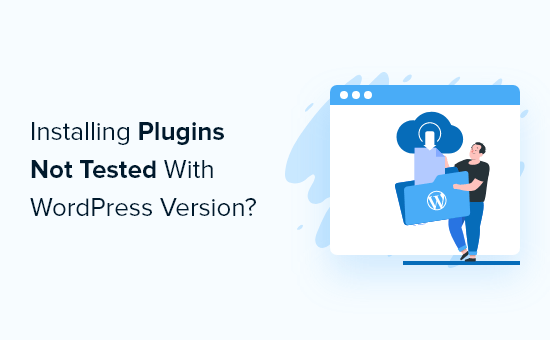
Como o WordPress obtém a informação “Plugin não testado”?
Você está se perguntando como o WordPress sabe se um plug-in foi testado com a sua versão do WordPress ou quem é responsável por testá-lo?
Ao enviar plug-ins para o diretório de plug-ins do WordPress, os autores devem incluir um arquivo “leia-me” junto com o plug-in. Esse arquivo é usado pelo WordPress para criar a página que contém detalhes sobre o plug-in.
Os autores de plug-ins são responsáveis por testar seus plug-ins com a versão mais recente do WordPress e atualizar manualmente o número da versão em seu arquivo leia-me.
Se você vir a mensagem “Este plug-in não foi testado com a versão mais recente do WordPress”, isso significa que o autor do plug-in não atualizou o arquivo leia-me com o número da versão mais recente do WordPress.
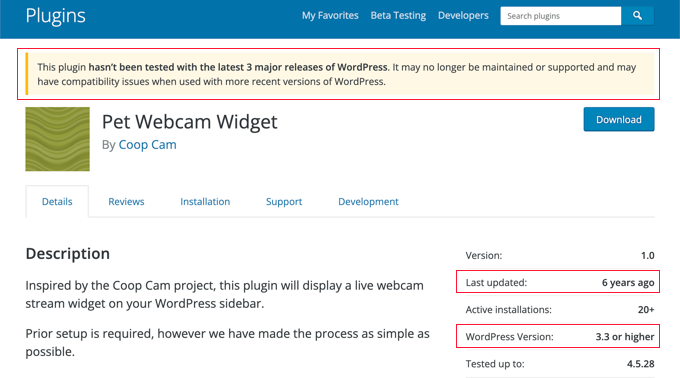
Isso não significa necessariamente que o plug-in causará erros no WordPress.
Por que os autores de plug-ins do WordPress não atualizam os arquivos Leiame?
Às vezes, os autores de plugins não atualizam seus arquivos leia-me, mesmo quando testam o funcionamento do plugin com cada nova versão do WordPress.
Em um mundo ideal, essas informações serão atualizadas sempre que um plug-in for testado para ser compatível com a mais nova atualização do WordPress.
No entanto, muitos desenvolvedores geralmente estão ocupados com projetos de desenvolvimento pagos. Como os plug-ins listados no repositório de plug-ins do WordPress são gratuitos, há menos incentivo para que os desenvolvedores mantenham os plug-ins e o arquivo leia-me constantemente atualizados.
Você deve instalar plug-ins do WordPress que não foram testados?
A resposta curta é: depende do plug-in.
O fato de o autor de um plug-in não ter atualizado o arquivo leia-me não significa que o plug-in não tenha sido testado e não funcione com a versão mais recente do WordPress.
Em geral, isso depende da funcionalidade do plug-in e de sua complexidade. Por exemplo, há plug-ins simples que se conectam diretamente ao núcleo do WordPress e não precisam ser atualizados durante anos para funcionar corretamente.
A mensagem “não testado” não diz que o plug-in tem problemas ou questões de segurança. Ela simplesmente diz que o desenvolvedor não testou o plug-in recentemente ou não atualizou o arquivo leia-me.
Aqui na WPBeginner, sugerimos a instalação de plug-ins que não tenham sido testados com a versão recente do WordPress em determinadas circunstâncias. Testamos exaustivamente o plug-in para garantir que ele funcione como deveria.
Se estiver lendo um de nossos tutoriais sobre WordPress publicado recentemente, isso significa que o plug-in era compatível com a versão mais recente do WordPress quando o testamos.
Outra maneira de verificar se você deve instalar o plug-in é acessar a página de desenvolvimento do plug-in. Isso mostra o grau de atividade do desenvolvedor do plug-in.
Basta acessar a página do plug-in do WordPress e clicar na guia “Desenvolvimento”.
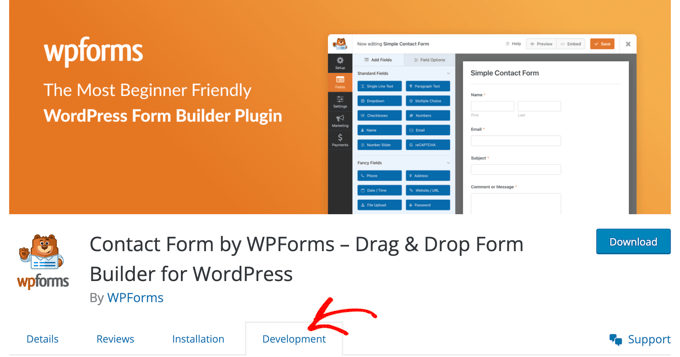
Aqui, você pode ver quando o plug-in foi atualizado pela última vez e as alterações e aprimoramentos recentes do plug-in na seção “Changelog”.
Se o desenvolvedor estiver atualizando ativamente o plug-in, isso geralmente significa que o plug-in é de alta qualidade e seguro para uso em seu site WordPress.
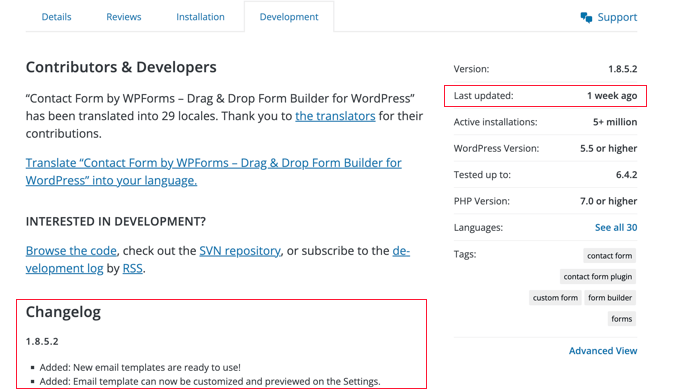
Por outro lado, se um plug-in não for atualizado há mais de dois anos, isso geralmente significa que ele foi abandonado. Nesse caso, você não deve instalar o plug-in, pois o desenvolvedor não o está mantendo ativamente.
Você também pode clicar na guia “Reviews” para ver outras opiniões e reclamações sobre incompatibilidade.
Se as avaliações forem recentes e cinco estrelas, então é seguro presumir que você pode usar o plug-in em seu site.
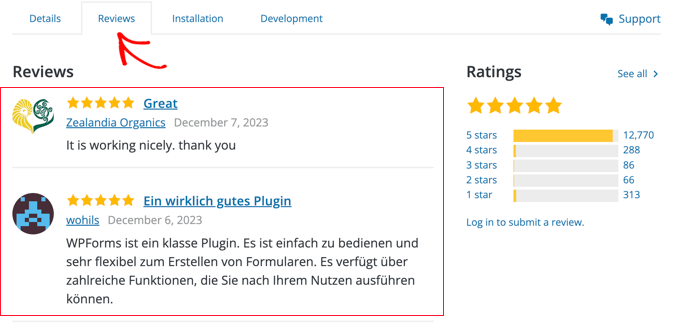
Por fim, você pode testar o plug-in em uma instalação local do WordPress. Isso permite que você veja se há algum problema ou conflito sem afetar seu site principal.
Esperamos que este artigo tenha ajudado você a saber se deve instalar plug-ins que não foram testados com sua versão do WordPress. Talvez você também queira ver nosso guia sobre a diferença entre um nome de domínio e uma hospedagem na Web ou nossas escolhas de especialistas para os melhores serviços de marketing por e-mail para pequenas empresas.
Se você gostou deste artigo, inscreva-se em nosso canal do YouTube para receber tutoriais em vídeo sobre o WordPress. Você também pode nos encontrar no Twitter e no Facebook.





Syed Balkhi says
Hey WPBeginner readers,
Did you know you can win exciting prizes by commenting on WPBeginner?
Every month, our top blog commenters will win HUGE rewards, including premium WordPress plugin licenses and cash prizes.
You can get more details about the contest from here.
Start sharing your thoughts below to stand a chance to win!
Moinuddin Waheed says
Most of the time many of us don’t install a plugin only because it has not been tested for the recent updates of the WordPress.
Thank you for the clarification that it doesn’t matter if it has not been tested and why it doesn’t matter whether it has been tested or not.
The functionality of the plugin is what decides it’s usability and whether it should be installed or not as wordpress review team already would have passed the checklist.
WPBeginner Support says
Glad we could help understand what to expect with the message
Administrador
Jiří Vaněk says
Thank you for the explanation. I always check this data before installing plugins and it never occurred to me that it works like this and the data just might not be up to date. So I’m assuming you’re then looking for information directly on the developer’s website?
WPBeginner Support says
Not always the developer’s site, you can also check the support forum for the plugin for if they are answering support questions.
Administrador
Jiří Vaněk says
Thanks, I’ll know it next time. I’ve abandoned many plugins like this out of fear that even the author doesn’t care. This is big news for me.
Moinuddin Waheed says
Thanks for clearing the doubts related to plugin update and it’s installation.
I have always took a step back while deciding to install a plugin for certain functionality as I have always get a fear of security vulnerabilities if the plugin is not updated in recent especially with WordPress updates.
Is there a mechanism used by wordpress plugin repository before allowing any one to submit plugins available for download to ensure compatibility and security?
or anyone can just add plugin to wordpress plugin repository available for download?
WPBeginner Support says
There is a review process for any plugin submitted to the WordPress.org plugin repository that would review a plugin before it is added.
Administrador
Jiří Vaněk says
So I’m assuming that some simple vulnerability testing of the code is also part of this process, or is that solely the responsibility of the plugin developer?
WPBeginner Support says
The review process checks the security, documentation, and presentation of the plugins added to the WordPress plugin repository. The plugin developer should be the one to manage the security of the plugin but the second check is there from the WordPress.org plugin review team to be safe.
Jiří Vaněk says
Wow, thank you wpbeginner team, for the clarification. I didn’t know this. It’s great to hear that not just anything gets into WordPress. Great
Andrew says
WordPress removed the compatibility section so now it’s impossible to vote. the warning means nothing at all, please confirm it and update.
WPBeginner Support says
Thank you for letting us know, we will certainly look into updating our article
Administrador
sazi says
thank you
Prashant Ranjan says
First of all thanks for this great eye opening article and clearing all doubts related to installing untested plugins. I have always hesitated installing untested plugins despite its great reviews just because it has not been tested for a particular theme. For example, I abstained from installing Google official Adsense plugin with my existing theme for my travel website for the same reason. Placing ads manually on each post is tedious so I will try it now. But how Google has not updated it’s read me file for Adsense plugin, is out of my understanding.
Nouman Younas says
I was searching for this topic.
recently checked my plugins and half of them not updated from months and some not updated from 2-3+ years.
I don’t know what to do… i preferred to disable those plugins which are not compulsory.
WPBeginner Support says
As mentioned in the article above, sometimes plugin author don’t feel the need to update the plugin if there is nothing broken. If a plugin is working fine on your site and it hasn’t been updated for less than 2 years, then you can use it. If its older than 2 years, then you should stop using it and find an alternative plugin.
Administrador
Nouman Younas says
thank you for answer
Yes. Finally i decided to remove those old plugins. some have not alternative like “currencyr”.
I guess, going for premium plugin is a good option or something else.
WPBeginner Support says
Glad you found it helpful. Did you checkout WP Currency Converter?
Kitty says
Thank you for this advice! So far in my minimal WP experience, I have steered clear of plugins that were not compatible with the most current version of my theme because I wouldn’t have a clue of how to fix something if the plugin adversely affected what I previously set up. Having the 2-year rule of thumb helped me decide to use a plugin that has not been updated in 1 year…so far so good (the plugin is the TinyMCE Spellcheck).
Doug says
Great detail and advice. I have been knocking this around in my head for so long I can’t tell you how much I appreciate the details!
Keith Davis says
Good advice and thanks for the additional info about plugins not updated for two years.
Makes perfect sense.
Peter Cralen says
Why somebody will install plugin if developer is even not able to update one number in readme file?
It is like purchase service from hosting company where their home page is down
WPBeginner Staff says
That’s the point you didn’t purchase it. It is available for free with no warranty and very limited support.
Peter Cralen says
I think price is not value, does not matter if its free or paid.
Better will be if people stay focused on quality instead of take something for free, bc. its free only.
Joel James says
I agree with you. Why can’t you test it your own, when it is free and you need it? Developers may not get time to update readme text on each WordPress updates. No point of complaining about it, since they are giving their work for free!!
Angélica Costa says
Because that plugin sometimes is the only one that works for you. And just because it hasn’t been updated, it does not mean in any way that is does not work.
And that is partially due to the awesome WordPress retrocompatibility.
Ryan Hellyer says
Some people refuse to update the readme because when doing that you also need to do a version number bump, which in turn triggers a release and causes users to need to update.
You can modify the readme without bumping your version number and hence triggering an update, but then you have multiple copies of the same plugin with the same version number which are not identical. Aside from feeling just wrong, that could theoretically trip up a security system which does a hash of the file system and checks with a known set of previously downloaded plugins.